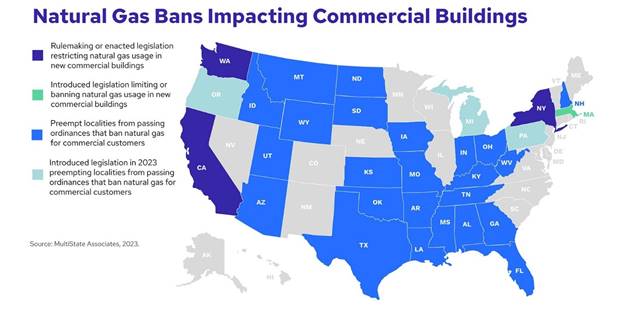Legislative Summer Update: EPA Ruling, Stormwater Issues, EV Charging Stations & Industry Labor Trends
June 7, 2023
Natural Gas Bans
There has been lots of talk about banning natural gas and other gas-powered machines. Below is a nice chart of the US on this issue.

EPA Ruling
The U.S. Supreme Court recently made a decision reigning in the EPA's Waters of the United States. This is big news for our industry, as it cleans up permitting with subjective tests and rules.
The EPA has interpreted its jurisdiction broadly to include some wetlands that aren’t directly connected to a body of water, an interpretation it says is necessary to protect against water pollution and consistent with Congress’s intent in passing the landmark environmental-protection law.
Justice Samuel Alito wrote in his opinion that the Clean Water Act covers only wetlands with a “continuous surface connection” to navigable waters, overturning a 2006 precedent recognizing federal protection for wetlands with a “significant nexus” to such bodies. The new interpretation, Alito wrote, “accords with how Congress has employed the term ‘waters’ elsewhere in the Clean Water Act.”
More info from The Wall Street Journal »
Stormwater Issues
Recent changes from the Department of Labor and Industry (DLI) stormwater management design requirements are drastically increasing infrastructure costs. Furthermore, there are certain cities that do not need to go through the state approval process, but can be approved at the city level. As a result, it affects smaller cities more often.
More info from the DLI »
Adult Diaper Changing Stations in Public Restrooms Required
The legislature recently passed a bill requiring the Department of Labor and Industry to include adult diaper changing stations in restrooms for new buildings or substantially renovated that are open to the public. The changing table is about 2’ X 6’ and must accommodate a 350-pound person.
Electric Vehicle Charging Stations
More info & a survey from MNDOT »
Industry Labor Trends
41% of the current construction workforce will retire by 2031.
18-24 year olds are underrepresented in the construction industry.
Current US construction workforce shortage is over 540,000.
Free healthcare & college for people living in Minnesota without legal US residency status.
40,000 undocumented residents will be eligible for free Minnesota care with taxpayer subsidies around $7,000 per individual. More info from MPR »
Free college to a state institution for any student who graduates from a Minnesota high school and family makes under $80,000/year beginning 2024.
Warehouse Distribution Worker Safety
This law establishes new worker safety requirements for warehouse distribution centers and requires the DLI to open investigations into warehouse distribution centers when injury rates warrant such scrutiny. It requires communication to employees about each quota they are required to meet, how the work standards for the quota will be measured, and any employment consequence for not meeting the quota. The law also allows employees to access work speed data and prohibits retaliation for seeking the data.
Construction Worker Wage Protection Act
This law establishes that a contractor entering a construction contract assumes liability for unpaid wages, fringe benefits and liquidated damages owed to a claimant by a subcontractor of any tier. This allows DLI to seek unpaid wages and liquidated damages owed to an employee from a contractor. This change is a targeted approach to help prevent wage theft in the construction industry.
Key Provisions that Started July 1
- Free school meals. All Minnesota K-12 students will now receive free breakfast and lunch at school each day, with the program paid through a combination of state and federal funds.
- Noncompete contract clauses banned. Minnesota employers may no longer put noncomplete clauses into employment contracts.
- Safety protections for health care workers. The Nurse and Patient Safety Act requires that hospitals develop an incident response plan to deal with increasing acts of violence against health care workers.
- Mental health for first responders. A new law requires up to 32 weeks of mental health treatment for police officers and firefighters.
- Limits on no-knock warrants. The Public Safety law will put limits on the ability of judges to issue no-knock search warrants. Such warrants will only be allowed if the search cannot be conducted when a home is unoccupied.
- Voting rights for former felons. Minnesotans convicted of a felony who have completed incarceration will have their right to vote restored starting July 1.
If you have any questions or concerns, please reach out!
Roz Peterson, Public Policy Director
roz@naiopmn.org | (612) 708-5281